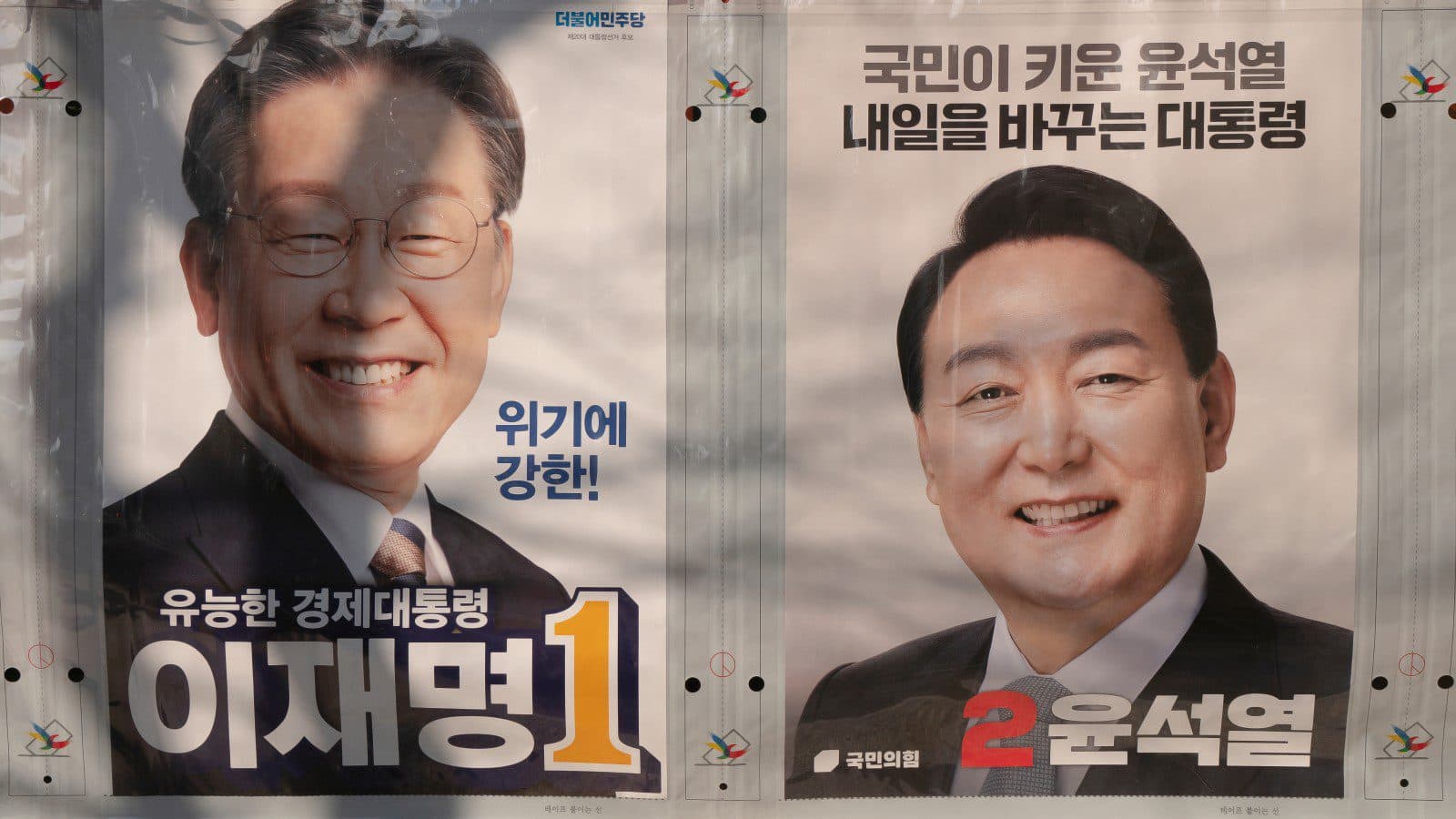Pro-crypto Candidate Yoon Suk Yeol Wins South Korea’s Presidency
South Korea is set to have a new president in May following a win by Yoon Suk-Yeol who platformed on crypto deregulation, among other issues

Posters of major candidates Lee Jae-Myung (left) and Yoon Suk-Yeol (right). Credit: Shutterstock
- Liberal Party candidate Yoon Suk Yeol has clinched a victory over political rival Lee Jae-Myung in a narrow race
- Pundits hope Yoon will pave the way for a new era of crypto deregulation in the country following campaign promises to do so
Politically conservative opposition candidate Yoon Suk Yeol has won South Korea’s presidential election following a narrow victory over political rival Lee Jae-myung.
Yoon, who is expected to take office in May and serve an initial five-year term, beat out the incumbent Democratic Party candidate Lee by less than 1%. Yoon managed to clinch 48.59% of the votes to Lee’s 47.80%, The Sydney Morning Herald reported Thursday.
The election win is a potential boon for the crypto scene in South Korea as both candidates platformed on promises to deregulate the digital asset industry among other policies designed to attract foreign investment.
Rival Lee had promised to review a 2017 ban on initial coin offerings (ICOs) put in place amid cases of domestic and international fraud following his win. It is unclear at this stage whether Yoon will target ICO regulation.
The president-elect has vowed to increase the capital gains tax threshold for crypto transactions set to be taxed by 20% next year. The move has been viewed as a means to attract younger voters currently staring down rising house prices, mounting income inequality and personal debt, which has soared amongst the 20-to-30-year-olds.
The former public prosecutor has also said he is aiming to foster blockchain and crypto unicorns — startup companies whose valuations exceed $1 billion — by relaxing certain rules over how those firms should be regulated.
“To realize the unlimited potential of the virtual asset market, we must overhaul regulations that are far from reality and unreasonable,” Yoon said during a speech on the campaign trail in January.
South Korea ranks 16th in terms of crypto adoption, with 1.9 million people, or 3.79% of its 55.7 million-strong population, owning some form of digital assets, according to data by payments provider Triple A. Many of those holding crypto do so via centralized exchanges.
Amended regulation aimed at crypto exchanges, which took effect in March last year, witnessed more than 60 marketplaces buckle under pressure to register with the country’s Financial Intelligence Unit which also required them to partner with banks to guarantee real-name accounts.
South Korea passed an amendment to the Act on the Reporting and Use of Specific Financial Transaction Information on March 5, 2020, which targeted virtual asset service providers (VASPs).
Under existing regulation, those providers must register an authorized bank account, obtain an Information Security Management System certificate and provide company and bank account details to the Korea Financial Intelligence Unit. They must also implement stringent “Anti-Money Laundering” and “Know-Your-Customer” procedures.
OKEx, a large Asian crypto exchange, decided to pull out of the country following the new rules rather than attempting to seek registration as a VASP, which also cited problems with its business.
Still, despite heavy regulation, domestic VASPs booked net profit exceeding $2.78 billion last year which included a mix of “coin-only” exchanges, five crypto wallets and four Korean won-based exchanges.
In November, South Korea’s financial regulator, the Financial Services Commission, declined to regulate NFTs claiming they do not fall under the definition of “virtual asset” provided by the Financial Action Task Force.
Among the notable crypto projects originating in the country is Terra, with its LUNA token and multiple algorithmic stablecoins, including one pegged to the South Korean won (KRT). The developer Terraform Labs, which is incorporated in Singapore, is headed by its South Korean CEO Do Kwon, and its CHAI dApp powers a widely-used mobile payments service similar to PayPal.
Get the news in your inbox. Explore Blockworks newsletters:
- The Breakdown: Decoding crypto and the markets. Daily.
- 0xResearch: Alpha in your inbox. Think like an analyst.






